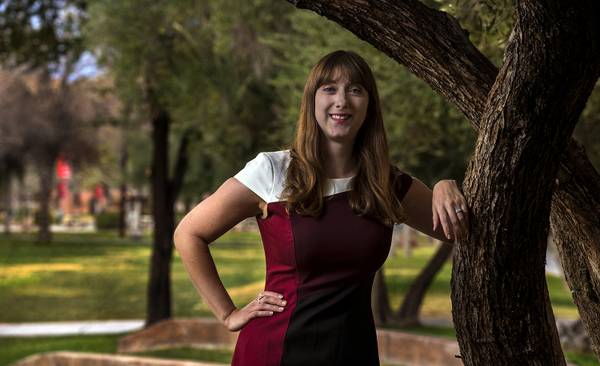On April 22, Earth Day, another group of protesters will march on Washington: scientists. They generally attempt political neutrality, but President Donald Trump’s policy actions and appointments have pushed many experts across many disciplines to consider taking this very public stand.
At UNLV, Emma Bloomfield is taking advantage of the teaching moment, helping students appreciate the ethics of political messaging. Specializing in rhetoric and science communication, the assistant professor directs her students to challenge her lectures and their own beliefs. It’s useful in the realm of climate change, as Trump’s White House has taken down all references on its website and generally denies the phenomenon.
What has been most interesting for you in researching climate change?
Climate change is most interesting when it intersects with religion. People who are Christian and conservative do deny climate change. But I’ve also found that there are so many interfaith groups and some Christian groups that are adopting the environment as a mandate from God — that they should go out and do some good for the environment. I think that divide is very interesting.
Why is this such a political issue?
There are two core issues, the first being the timing aspect of climate change and the second being money. People aren’t really seeing a lot of real-world, temporal effects of climate change now. It’s hard for people to think long-term. So because our politics is so very short in terms of time span ... It’s hard for politicians to take it seriously and to campaign on it. The second, I think, is because a lot of the people who are advocating for the environment are nonprofits that don’t have a lot of donation power. But large companies and businesses that can be hurt by environmental protection laws have the dollars to motivate politicians to avoid or at least put climate change on the back burner.
What are your thoughts on President Trump’s denial of climate change?
I’m definitely concerned with the new administration’s willingness to deny information and to deny facts. Policies being released that say the Environmental Protection Agency can’t publish research or information on climate change are a very clear silencing of science. To see the protests on the Dakota (Access) Pipeline be successful and then immediately be quashed with a simple executive order (gives the impression) that what the public wants and thinks isn’t as important as an individual person’s beliefs. That’s fairly terrifying, especially for people who work in science or in areas of the environment. If someone wants to argue that this money could be used elsewhere, then that’s an argument about value and priorities. But to say this is not happening is completely irresponsible.
Is it more challenging teaching rhetoric in a time of “post-truth” and fake news?
It’s definitely more difficult to teach in my persuasive classes and my rhetoric classes because we teach that good communication and strategic communication have to be anchored in ethics and morals and what’s best for society. It’s hard to say that those values and those ethics are persuasive when we see people being persuasive in unethical and immoral ways.
What is the best way to converse with a climate-change denier?
The key is to not approach the conversation as an argument. Oftentimes, you’ll figure out that their denial is rooted in a general distrust of scientists or elites. If you can figure out what’s anchoring that denial, you can sometimes say, “Why don’t you look at it this way?” If you don’t know where that resistance is coming from, just throwing facts at someone is not going to change their core outlook.
Why are scientists seen as elites?
People can get very discouraged when they think they’re not the smartest person in the room. Everyday people can be just as powerful as everybody else, but the presence of elites can challenge that notion. The stereotype of the arrogant academic has some roots in reality, but (there’s) also a purposeful framing of that narrative by people who want us to distrust scientists.
Should environmentalists’ message be tweaked to “save our species” rather than “save the planet”?
We could definitely tweak the message to be more aware of how people prioritize. ... It’s absolutely natural for people to prioritize ourselves over things like “save the polar bears.” There’s a communication theory that shows locating climate change problems in someone’s neighborhood can be a way to overcome climate change resistances.


Join the Discussion:
Check this out for a full explanation of our conversion to the LiveFyre commenting system and instructions on how to sign up for an account.
Full comments policy